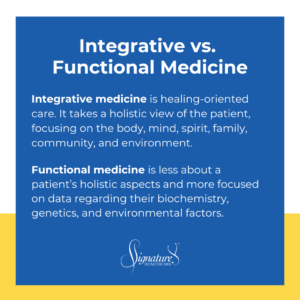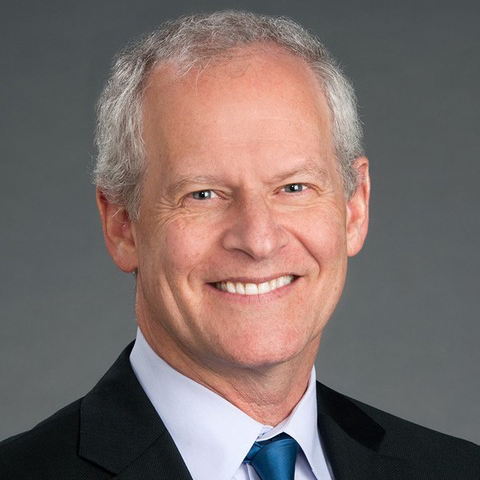Integrative vs. Functional Medicine: How Do They Compare?
Our front desk staff is on the front line of patients’ call-in questions, and they’re often asked, “What’s the difference between integrative medicine and functional medicine?”
Often, the caller wants to explore health solutions beyond conventional medicine. Perhaps traditional treatment hasn’t delivered the desired results, or they want greater personal control over their health and well-being.
Several alternative practice “labels” have become buzzwords: allopathic medicine, complementary medicine, integrative medicine, functional medicine, etc. Although they differ slightly in approach, they share a common goal: helping every patient achieve optimal well-being across all parameters of their personal health.
Both integrative medicine and functional medicine may make use of approaches that can be called alternative medicine. Alternative medicines include interventions and classes of medical practice not typically taught in medical schools. However, more concierge practices and traditional medical centers than ever before offer integrative and functional medicine.

Integrative vs. Functional Medicine
Let’s explore integrative vs. functional medicine:
- Integrative medicine is healing-oriented care. It takes a holistic view of the patient, focusing on the body, mind, spirit, family, community, and environment. It applies any appropriate therapies that may benefit the patient.We call integrative medicine “evidence-informed” medicine. While every intervention may not have a randomized control trial, if an approach to treatment is backed by experience and evidence, we may feel confident that it’s safe and could benefit a specific patient under the right circumstances.We often focus on elements that can’t be measured biochemically, such as a person’s moods or sleep quality. Our recommendations may incorporate teachings from centuries-old care systems, such as Chinese medicine, Ayurveda, energy medicine, and even botanical supplements.
- Although similar to integrative medicine, functional medicine specialists make recommendations regarding diet, lifestyle, and supplements from a slightly different perspective than an integrative specialist.Functional medicine typically focuses more on lab data regarding a person’s unique biochemistry, genetics, and environmental factors. Through testing, functional medicine examines factors like gut biome permeability, inflammatory markers, hormone levels, and more.
Our Innate Capacity to Heal
Whether a patient is suffering from irritable bowel syndrome, migraines, lower back pain, cardiovascular disease, cancer, or an autoimmune disorder, the individual or combined use of integrative medicine and functional medicine supports the person’s well-being. It can often help address the underlying ailment.
My preference — and my training — are specific to integrative medicine. We use standard medical tests and screenings that a doctor in conventional medicine might, but we also believe in each patient’s innate healing capacity. We partner with patients to co-develop a health program that meets their unique goals and supports the gifts of healing they already possess.
I was fortunate to graduate from the first class in the nation’s first integrative medicine program at the University of Arizona College of Medicine. At that time, program leaders decided not to include functional medicine in the curriculum.
The feeling then was that functional medicine relied heavily on certain lab test results that didn’t always align with a person’s clinical picture and health status. Some functional specialists prescribed a large number of vitamin supplements and herbs based on lab results. While those products cost patients a lot of money, they didn’t consistently deliver a measurable benefit.
Functional medicine has evolved since then. Most functional medicine doctors today are more strategic about ordering labs and recommending agents based on test results.

Integrative vs. Functional Medicine: Which Is Best?
Integrative and functional medicine practitioners believe we have an inherent capacity to heal, as long as our systems are balanced. So, within both disciplines, the practitioner’s role is to:
- Partner with patients in a way that helps them participate more fully in their healthcare.
- Optimize health and well-being using the best of conventional medical and complementary medical therapeutics specific to a given person’s circumstances.
- Reduce exposure to potentially harmful therapies if and when doing so could be appropriate.
- Optimize balance within the person — their “internal” and “external” environment, factors they introduce into their lives, poor sleep health, stressors, and any other causes of imbalance they share with us.
- Help the patient take advantage of the natural healing ability they were born with.
In integrative medicine, where indicated, we can and do apply elements from different long-respected healthcare systems — Chinese medicine, Ayurveda, herbs, energy, etc. — to see what stimulates the individual’s unique healing capacity.
If they’ve had a conventional medical evaluation for an ailment but still don’t feel well, I find other ways the patient can take control of their health: dietary changes, lifestyle changes, and complementary treatments that align with their values. We can often detect and treat many indicators, including inflammation, without additional medications.
Patients may find they have far more control over their condition than they realized. Even when there’s a family predisposition toward an illness, the individual may learn they’re not predestined to get it. Or, we can delay the illness’s onset and minimize its impact.
If the illness persists, I may refer the patient to a trusted functional medicine practitioner to recommend a particular agent or supplement. It’s essential to receive this type of care in collaboration with the patient’s primary care doctor and specialists so that everyone is on the same page.
(Integrative and functional medicine approaches are sometimes not covered by insurance, so we encourage patients to explore what their policy covers.)
Integrative vs. Functional Medicine: The View From Traditional Medicine
Doctors trained only in conventional Western medicine sometimes consider integrative or functional medicine “not science-based.” But there’s a big difference between there being no evidence and supporting data… and simply being unaware that any exists.
Most Western medicine practitioners are overwhelmed by the studies, research articles, and survey data issued within their own field of practice. And because they’re often unfamiliar with complementary medical practices, they tend to support our findings only when more formal studies confirm them in their peer-reviewed medical journals.
While these formal studies are appropriate, patients should not have to wait five or more years for the next study about their natural healing capacity. They deserve to learn about safe ways to get better now.
The entire field of medicine would benefit from informed cooperation between all types of practitioners. We’re all working toward the same goal: helping people feel their best and enjoy a long, healthy life.
Be Active in Your Own Care
You may do well as a passive recipient of conventional medical care, but you’ll almost always fare better when you actively participate in your own care.
So, when it comes to integrative vs. functional medicine, which is better? I encourage you to explore both approaches to healthcare to see which one feels best for you. I am biased, and I feel integrative medicine is a more optimistic, evidence-based, and engaging way to support and enhance well-being.
As an integrative medicine specialist, I can complement your conventional medical care by recommending individualized healthy lifestyle habits. I can also suggest additional personalized treatments to help you take control where you can and achieve optimal health.
Interested? Reach out. I’m always happy to answer your questions.

Dr. Russ Greenfield
Dr. Greenfield was among the first physicians to train under the direct guidance of Dr. Andrew Weil and has been practicing Integrative Medicine for over 25 years. He is Board Certified in Emergency Medicine and Lifestyle Medicine.
Get the latest News
Join the Signature Healthcare Newsletter to get the latest articles, resources, and news delivered directly to your inbox.

